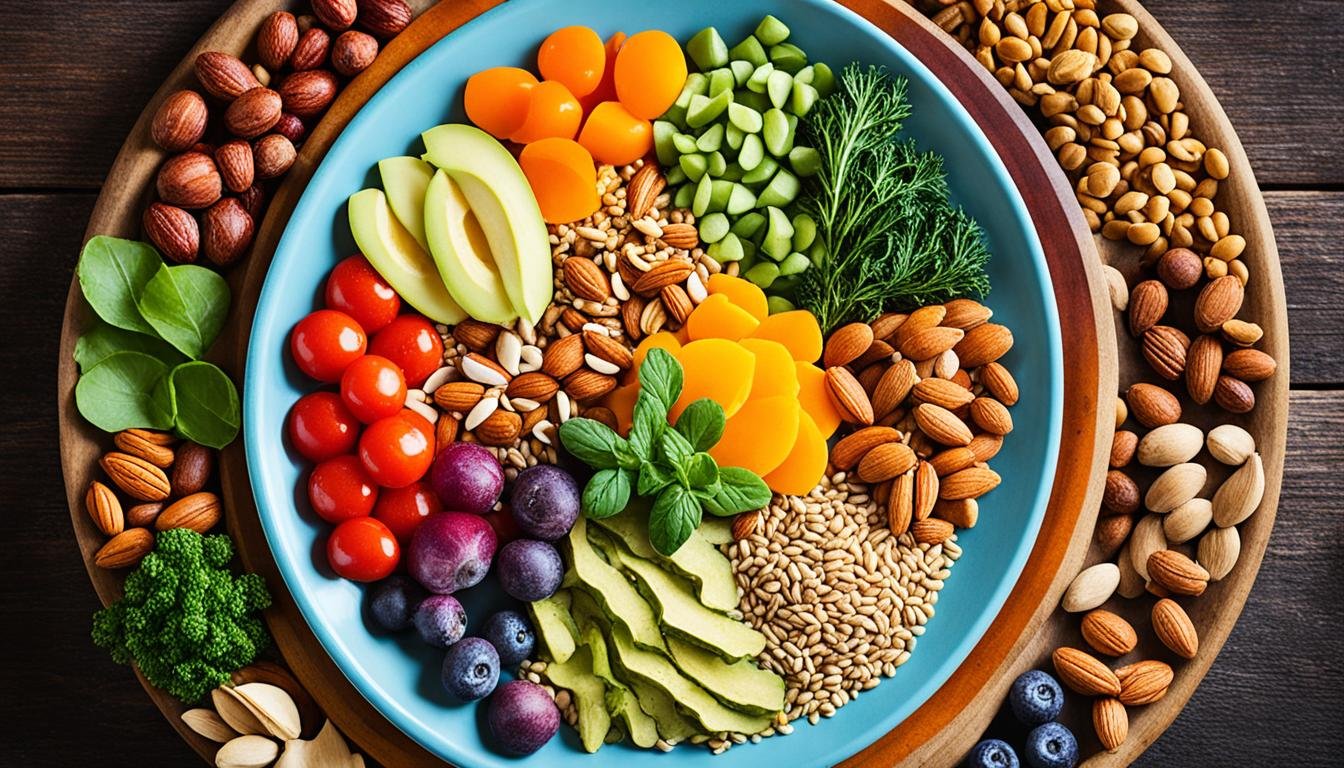Welcome to my article on creating a balanced Ayurvedic meal plan for holistic health. In this guide, I will explore the principles of the Ayurvedic diet and how it can promote mind-body balance, digestive health, and overall holistic wellness. By incorporating Ayurvedic principles into your daily life, you can experience the numerous benefits this ancient practice has to offer.
Table of Contents

Key Takeaways:
- The Ayurvedic diet aims to achieve harmony between the mind, body, and soul
- It is tailored based on an individual’s dosha, or body type
- Ayurvedic foods include home-cooked meals, fresh local produce, and specific ingredients based on the dosha
- The diet promotes improved digestion, emotional well-being, and weight control
- Following a balanced Ayurvedic meal plan can lead to holistic wellness
Understanding Your Dosha in the Ayurvedic Diet
In the Ayurvedic diet, individuals are categorized into three doshas – Vata, Pitta, and Kapha – based on their physical and mental characteristics. Each dosha has specific dietary guidelines to promote balance and overall well-being.
The Three Doshas:
- Vata: Vata individuals are typically energetic, creative, and quick-thinking. They are prone to imbalances such as anxiety, dryness, and digestive issues. The Ayurvedic diet for Vata focuses on warm and moist foods that help ground and nourish the body.
- Pitta: Pitta individuals are known for their strong metabolism, intense focus, and competitive nature. They may experience imbalances such as irritability, heartburn, and inflammation. The Ayurvedic diet for Pitta emphasizes cooling and mild options to soothe and balance the body.
- Kapha: Kapha individuals tend to be calm, nurturing, and loyal. They may face imbalances such as weight gain, sluggishness, and congestion. The Ayurvedic diet for Kapha emphasizes light and dry foods to invigorate and energize the body.
Understanding your dominant dosha is crucial in creating a personalized Ayurvedic diet plan. By following the specific dietary guidelines for your dosha, you can promote balance, manage imbalances, and support your overall well-being.
“The three doshas of Vata, Pitta, and Kapha form the foundation of the Ayurvedic diet. By aligning your dietary choices with your dosha, you can optimize your health and well-being.” – Dr. Aviva Romm
Developing an Ayurvedic meal plan that accounts for your dosha’s specific needs can be challenging. However, seeking guidance from an Ayurvedic practitioner or using online resources can simplify the process and help you create a balanced and nourishing diet.
| Dosha | Main Characteristics | Recommended Foods | Avoided Foods |
|---|---|---|---|
| Vata | Energetic, creative, prone to anxiety and dryness | Warm and moist foods, grounding spices | Cold and dry foods, excessive caffeine |
| Pitta | Strong metabolism, focused, prone to irritability | Cooling and mild foods, calming herbs | Spicy and acidic foods, excessive alcohol |
| Kapha | Calm, nurturing, prone to weight gain | Light and dry foods, warming spices | Heavy and oily foods, refined sugars |
Benefits of the Ayurvedic Diet

The Ayurvedic diet offers numerous benefits, promoting overall health and well-being through the consumption of whole foods, which are rich in nutrients and essential for vitality. This holistic approach not only supports weight loss but also encourages mindfulness, fostering a positive relationship with food and reducing stress and binge eating. By embracing the Ayurvedic diet, individuals can nourish their bodies and minds, achieving a state of balance and harmony.
“The Ayurvedic diet provides a wealth of benefits for both physical and emotional health. By focusing on whole foods, individuals can experience improved digestion, increased energy levels, and enhanced immune function.”
– DR. Anjali Chopra, Ayurvedic Practitioner
One of the key advantages of the Ayurvedic diet is its emphasis on whole foods. By consuming unprocessed and nutrient-dense ingredients, individuals nourish their bodies with essential vitamins, minerals, and antioxidants. This can aid in weight loss, as whole foods are often lower in calories and higher in fibre, promoting satiety and reducing the likelihood of overeating.
Additionally, the Ayurvedic diet promotes mindfulness, a practice that encourages individuals to be fully present in the eating experience. By paying attention to the flavours, textures, and aromas of their food, individuals foster a deeper appreciation for each meal. This mindful approach helps to establish a healthier relationship with food, reducing stress and emotional eating tendencies.
Ayurvedic Diet and Weight Loss
The Ayurvedic diet offers a holistic approach to weight loss, focusing on nourishing the body rather than restrictive practices. By incorporating a variety of whole foods, individuals can achieve a balanced and sustainable approach to shedding excess weight.
This type of diet emphasizes foods that are fresh, organic, and seasonal. It encourages the consumption of fruits, vegetables, whole grains, legumes, and lean proteins while minimizing the intake of processed foods, refined sugars, and saturated fats. By following these guidelines, individuals can fuel their bodies with nutrient-dense meals, providing a solid foundation for weight management.
Ayurveda also recognizes the importance of digestion in weight loss. It recommends mindful eating practices such as chewing each bite thoroughly and eating meals in a calm and relaxed environment. This aids in proper digestion and nutrient absorption, supporting overall health and weight management.
Additionally, Ayurveda recognizes that each person is unique and may require a personalized approach to weight loss. By understanding one’s dosha, or body type, individuals can tailor their diet and lifestyle choices to support their specific needs and goals.
The Ayurvedic Diet and Mindfulness
Mindfulness is a fundamental component of the Ayurvedic diet, promoting a greater sense of awareness and connection with one’s body and food. By practicing mindfulness during mealtimes, individuals can cultivate a deeper appreciation for the nourishment they are providing themselves and develop a more positive relationship with food.
When practicing mindfulness, individuals are encouraged to eat slowly, savour the flavours, and listen to their body’s hunger and fullness cues. This not only enhances the eating experience but also allows individuals to recognize and address emotional triggers that may lead to unhealthy eating habits.
Furthermore, mindfulness contributes to stress reduction, which is essential for maintaining a healthy weight and overall well-being. By focusing on the present moment and becoming more attuned to their body’s needs, individuals can manage stress more effectively and make conscious choices in their eating habits.
| Benefits of the Ayurvedic Diet |
|---|
| Promotes overall health and well-being |
| Aids in weight loss through nutrient-dense foods |
| Encourages mindfulness and positive eating habits |
| Supports stress reduction and emotional well-being |
Foods to Eat According to Your Dosha
When following the Ayurvedic diet, it’s important to consider your dosha, or body type, as it determines the specific foods that are recommended for you. Each dosha – Vata, Pitta, and Kapha – has its own unique set of dietary guidelines to promote balance and optimal health.
Vata Dosha:
If you have a Vata dosha, which is associated with the elements of air and ether, it’s important to focus on warming and grounding foods. These foods help to balance the cold, dry, and light qualities of Vata. Some examples of foods to include in your Ayurvedic diet are:
- Root vegetables like sweet potatoes, carrots, and beets
- Ghee (clarified butter) for its nourishing properties
- Warm and cooked grains such as rice and quinoa
- Hearty soups and stews
- Warm spices like ginger, cinnamon, and turmeric
Pitta Dosha:
If your dosha is Pitta, which is associated with the elements of fire and water, you’ll benefit from cooling and refreshing foods to balance the hot and sharp qualities of Pitta. Some foods to include in your Ayurvedic diet are:
- Cooling fruits like cucumber, watermelon, and grapes
- Leafy greens and bitter vegetables
- Mint and cilantro for their cooling properties
- Coconut oil for its cooling and soothing effects
- Refreshing beverages like coconut water and herbal teas
Kapha Dosha:
If you have a Kapha dosha, which is associated with the elements of earth and water, it’s important to focus on light and warming foods to balance the heavy and cool qualities of Kapha. Some examples of foods to include in your Ayurvedic diet are:
- Light and dry fruits like apples, pears, and berries
- Warm and stimulating spices like black pepper, cayenne, and ginger
- Legumes and whole grains in moderation
- Steamed vegetables and leafy greens
- Herbal teas and warm water with lemon for its cleansing effects
By incorporating these dosha-specific foods into your Ayurvedic diet, you can support the balance and harmony of your body, mind, and spirit.
Creating a Balanced Ayurvedic Meal Plan
When it comes to the Ayurvedic diet, creating a balanced meal plan is crucial for optimizing your health and well-being. By considering your dosha and its associated qualities, you can design a meal plan that promotes balance and harmony in your body.
Here are some key principles to keep in mind when creating your Ayurvedic meal plan:
- Eat Fresh, Whole Foods: Emphasize the consumption of fresh, organic, and locally-sourced foods. These foods are rich in nutrients and free from harmful additives, promoting optimal health.
- Tailor the Plan to Your Dosha: Based on your dominant dosha, customize your meal plan to suit your body’s specific needs. This ensures that you are providing the right balance of nutrients and supporting your dosha’s natural tendencies.
- Mindful Eating: Practice mindful eating by savouring each bite, chewing thoroughly, and paying attention to your body’s hunger and fullness cues. This helps improve digestion and allows you to fully enjoy your meals.
- Moderation: Avoid overeating or restricting yourself too much. Find a balance that suits your body’s needs and respects its natural rhythms.
Here is a sample Ayurvedic meal plan for each dosha:
Vata Dosha Meal Plan:
| Meal | Food Choices |
|---|---|
| Breakfast | Warm oatmeal topped with sliced fruits and a sprinkle of cinnamon |
| Lunch | Quinoa salad with roasted vegetables and a drizzle of olive oil |
| Dinner | Steamed vegetables with basmati rice and lentil soup |
| Snacks | Almonds, dates, and a cup of herbal tea |
Pitta Dosha Meal Plan:
| Meal | Food Choices |
|---|---|
| Breakfast | Sliced melon with a sprinkle of cardamom and a glass of coconut water |
| Lunch | Spinach salad with grilled chicken and a side of quinoa |
| Dinner | Grilled salmon with steamed asparagus and brown rice |
| Snacks | Yogurt with sliced cucumber and mint leaves |
Kapha Dosha Meal Plan:
| Meal | Food Choices |
|---|---|
| Breakfast | Warm quinoa porridge with berries and a sprinkle of ginger |
| Lunch | Vegetable stir-fry with tofu and a side of brown rice |
| Dinner | Baked chicken breast with roasted vegetables and a side of steamed broccoli |
| Snacks | Apple slices with almond butter |
Remember to adjust portion sizes and ingredients according to your specific needs and preferences. Consulting with an Ayurvedic practitioner can provide further guidance and personalized recommendations for your dosha.
Create a balanced Ayurvedic meal plan based on your dosha and enjoy the benefits of a nourishing and harmonious diet.
Ayurvedic Cooking Tips for Mindful Eating
Ayurvedic cooking emphasizes the importance of mindful eating, which involves fully engaging your senses and being present in the moment while enjoying your meal. By incorporating Ayurvedic principles into your cooking and eating habits, you can cultivate a deeper connection with your food, enhance digestion, and promote overall well-being.
Eating According to Your Dosha
In Ayurveda, each individual is believed to have a unique mind-body constitution, or dosha. Eating according to your dosha can help promote balance and optimize your health. Here are some general guidelines for each dosha:
- Vata: Choose warm, moist, and grounding foods that can help nourish and stabilize your energetic and creative nature.
- Pitta: Opt for cooling and mild foods that can help balance your naturally fiery and intense energy.
- Kapha: Favour light and dry foods that can help counterbalance your grounded and stable nature.
Incorporating All Six Tastes
Ayurveda recognizes six tastes – sweet, sour, salty, bitter, pungent, and astringent – each having its own unique qualities and effects on the body. To ensure a well-rounded and satisfying meal, try to incorporate all six tastes in each meal. Here are some examples of foods that correspond to each taste:
- Sweet: Fruits, grains, honey
- Sour: Citrus fruits, yogurt, vinegar
- Salty: Sea salt, seaweed, soy sauce
- Bitter: Leafy greens, turmeric, fenugreek
- Pungent: Ginger, garlic, chili peppers
- Astringent: Legumes, green tea, cranberries
By including all six tastes, you can ensure a diverse range of nutrients and flavours in your meal, satisfying both your body and senses.
Tips for Mindful Eating
Mindful eating is an essential practice in Ayurveda that can help you develop a healthier relationship with food and make more conscious choices. Here are some tips for practicing mindful eating:
- Avoid Distractions: Turn off the TV, put away your phone, and create a calm and focused environment while eating.
- Avoid Beverages and Cold Drinks: Drinking fluids during meals can weaken digestion. It is best to sip warm water before and after eating.
- Stop Snacking: Give your digestive system ample time to rest between meals. Avoid excessive snacking throughout the day.
By following these Ayurvedic cooking and eating tips, you can promote mindful eating, enhance digestion, and cultivate a deeper connection with your food.
Factors to Consider in an Ayurvedic Diet
When following an Ayurvedic diet, it is important to take into account various factors to ensure optimal results. These include dietary restrictions, routine, and mindful eating habits.
Considering any dietary restrictions is essential to customize the Ayurvedic diet plan according to individual needs and preferences. Whether it’s due to allergies, intolerances, or personal choices, making adjustments to accommodate these restrictions will help maintain a sustainable and enjoyable diet.
Establishing a regular eating schedule is another crucial aspect of the Ayurvedic diet. This involves eating meals at consistent times throughout the day, allowing the body to establish a routine and optimize digestion. It is recommended to have the biggest meal of the day at lunchtime when the body’s digestion is typically strongest.
Additionally, eating seasonally is encouraged in Ayurveda. Consuming foods that are in season provides the body with the necessary nutrients and supports overall well-being. It also promotes a connection with nature and a harmonious lifestyle.
Another consideration is the timing and quantity of meals. Ayurveda emphasizes mindful eating, which means being aware of hunger and fullness cues. It is recommended to eat when hungry and avoid overeating. Drinking warm water between meals is also beneficial for digestion and hydration.
Incorporating these factors into an Ayurvedic diet promotes balance, harmony, and overall well-being.
My Ayurvedic Routine
- Start the day with a glass of warm water and lemon to aid digestion.
- Have a balanced breakfast with whole grains, fruits, and nuts.
- Eat a light lunch with a variety of vegetables and lean proteins.
- Enjoy herbal tea or a small snack in the afternoon.
- Have a modest dinner with cooked vegetables and a source of protein.
- Practice mindful eating by savouring each bite and paying attention to hunger and fullness cues.
- End the day with a calming bedtime routine to promote a restful sleep.
Ayurvedic principles have transformed my relationship with food. By following an Ayurvedic diet and incorporating mindful eating habits, I have experienced improved digestion, increased energy levels, and a greater sense of overall well-being.
Role of Ayurvedic Products in the Diet

Ayurvedic products play a vital role in the Ayurvedic diet, providing numerous health benefits to individuals seeking holistic wellness. Two popular Ayurvedic products are honey and Chyawanprash, each offering unique properties that contribute to overall health and well-being.
Honey is renowned for its remarkable anti-inflammatory and antibacterial properties. It has been used for centuries in Ayurveda for its ability to soothe the digestive system and support respiratory health. Incorporating honey into the Ayurvedic diet enhances the flavour of various dishes while providing potential health benefits.
Chyawanprash is an herbal formulation that holds a special place in Ayurveda. It is a complex blend of herbs, honey, ghee, and other natural ingredients. Chyawanprash is known to support the immune system, promote digestion, and nourish the body. This Ayurvedic superfood can be consumed on its own or mixed with warm milk or water.
| Ayurvedic Product | Benefits |
|---|---|
| Honey | Anti-inflammatory and antibacterial properties, soothing to the digestive system, supports respiratory health |
| Chyawanprash | Supports the immune system, promotes digestion, nourishes the body |
Incorporating these Ayurvedic products into your diet can enhance the flavour and nutritional content of your meals, while also providing potential health benefits. It is important to choose high-quality Ayurvedic products from trusted sources to ensure their effectiveness and authenticity.
The use of Ayurvedic products, such as honey and Chyawanprash, adds depth and therapeutic value to the Ayurvedic diet. These natural remedies have been cherished for their contributions to overall health and well-being for centuries.
Incorporating Ayurvedic Principles in Daily Life
Adopting Ayurvedic principles goes beyond just the diet and includes lifestyle modifications. By integrating Ayurvedic practices into your daily life, you can enhance your overall well-being and achieve holistic balance. Here are some key ways to incorporate Ayurvedic principles into your routine:
Identify Your Dosha
Start by identifying your dosha, or body type, which is fundamental in Ayurveda. There are three doshas – Vata, Pitta, and Kapha – each with unique characteristics. Understanding your dominant dosha can help you tailor your lifestyle choices to promote balance and well-being.
Make Mindful Food Choices
In Ayurveda, food is considered medicine. Pay attention to the qualities of the food you consume and choose nourishing options that align with your dosha. Emphasize whole, unprocessed foods, and prioritize fresh, seasonal ingredients. Eating mindfully, free from distractions, can enhance your digestive health and overall well-being.
Practice Stress Management Techniques
Ayurveda recognizes the impact of stress on our physical and mental health. Incorporate stress management techniques such as yoga, meditation, and deep breathing exercises into your daily routine. These practices can help reduce stress, promote relaxation, and enhance your overall sense of well-being.
Establish a Daily Routine
Ayurveda emphasizes the importance of a consistent daily routine to maintain balance. Establish a schedule that aligns with your natural rhythms, including regular times for waking up, eating meals, and going to bed. This regularity can support optimal digestion, sleep, and overall vitality.
Seek Guidance from an Ayurvedic Practitioner
Consulting with an Ayurvedic practitioner can provide personalized recommendations tailored to your unique needs and dosha. They can guide you on specific lifestyle modifications, herbal remedies, and other Ayurvedic practices that can enhance your holistic well-being.
By incorporating Ayurvedic principles into your daily life, you can experience the profound benefits of this ancient holistic system. From mindful food choices to stress management techniques, Ayurveda offers a comprehensive approach to nurturing your mind, body, and soul.
Potential Benefits of the Ayurvedic Diet
The Ayurvedic diet offers a range of potential benefits, including improved digestion, weight loss, and better emotional health. By following the guidelines of this holistic eating approach, individuals can experience an overall improvement in their well-being and establish a sustainable approach to healthy eating.
The Ayurvedic diet focuses on nourishing the body with whole, nutrient-dense foods that promote optimal digestion. By consuming foods specifically tailored to your dosha, you can support your body’s natural processes and enhance nutrient absorption.
Improved Digestion: The Ayurvedic diet emphasizes the consumption of easily digestible foods and offers various digestive aids. These include spices like ginger and turmeric, which can reduce inflammation and promote healthy digestion. Additionally, mindful eating techniques are encouraged, such as eating in a calm and relaxed environment, chewing food thoroughly, and avoiding overeating.
Weight Loss: One of the potential benefits of the Ayurvedic diet is weight loss. By focusing on whole foods and making mindful choices, you can create a calorie deficit while ensuring proper nutrition. The Ayurvedic diet also emphasizes the importance of maintaining a healthy metabolism, supporting weight management in the long term.
Better Emotional Health: The Ayurvedic diet recognizes the connection between our physical and emotional well-being. It emphasizes the consumption of fresh, whole foods that are known to nourish not only the body but also the mind. By choosing foods that promote balance and harmony in the body, you may experience improved emotional well-being and reduced mood swings.
The Ayurvedic diet offers a holistic approach to health and wellness, focusing on nurturing the mind, body, and soul. By following this ancient practice, individuals can harness the potential benefits of improved digestion, weight loss, and enhanced emotional health.
Here’s a closer look at the potential benefits of the Ayurvedic diet:
| Benefits | Description |
|---|---|
| Improved Digestion | The Ayurvedic diet promotes digestive health through the consumption of easily digestible foods and digestive aids such as spices and mindful eating techniques. |
| Weight Loss | By focusing on whole foods and making mindful choices, the Ayurvedic diet can support weight loss and long-term weight management. |
| Better Emotional Health | Choosing foods that promote balance and harmony in the body can contribute to improved emotional well-being and reduced mood swings. |
By incorporating the principles of the Ayurvedic diet into your lifestyle, you may discover a path to better health and well-being that extends beyond just physicality.
Drawbacks of the Ayurvedic Diet
The Ayurvedic diet, while offering numerous benefits, also comes with its fair share of drawbacks. It is important to consider these limitations before incorporating it into your lifestyle. Here are some of the key drawbacks:
Subjectivity in Dosha Determination
One of the main challenges in following the Ayurvedic diet is determining your dosha accurately. Dosha assessments rely on self-reporting and can be subjective, leading to potential inaccuracies in identifying your dominant dosha. This subjectivity can impact the effectiveness of the diet plan.
Confusion and Restriction
The Ayurvedic diet can be confusing, especially for beginners. With its emphasis on individualized meal plans based on dosha, navigating the recommended food choices can be overwhelming. Additionally, some individuals may find the diet to be restrictive as it may exclude certain healthy foods and food groups.
Long-term Sustainability
While the Ayurvedic diet can provide short-term benefits, sustaining it in the long run may be challenging. The restrictive nature of the diet may make it difficult for individuals to adhere to it consistently over time. This can have an impact on long-term compliance and overall success in reaping the potential benefits.
Individual Variation
Each person’s body and health needs are unique, and what works well for one individual may not work as effectively for another. The Ayurvedic diet’s general guidelines may not address specific dietary requirements or health conditions of every individual, necessitating additional modifications and consultations with healthcare professionals.
Dependence on Traditional Knowledge
The Ayurvedic diet is rooted in traditional knowledge passed down through generations. While this historical wisdom holds value, its application may not always align with modern dietary guidelines or scientific research. It is important to consider an evidence-based approach and consult with healthcare professionals for a comprehensive understanding of your dietary needs.
Despite these drawbacks, the Ayurvedic diet continues to be embraced by many individuals seeking a holistic approach to nutrition and well-being. Understanding its limitations can help you make an informed decision about whether it is the right dietary approach for you.
Conclusion
The Ayurvedic diet offers a holistic approach to eating, focusing on the mind, body, and soul. By understanding your dosha and making mindful food choices, you can create a diet that promotes balance and harmony in your overall well-being.
Integrating Ayurvedic principles into your daily life can have profound effects on your health. From choosing foods that are aligned with your dosha to practicing stress management techniques like yoga and meditation, you can enhance your journey towards holistic wellness.
Seeking guidance from an Ayurvedic practitioner can provide personalized recommendations tailored to your specific needs. They can help you navigate the intricacies of the Ayurvedic diet, ensuring that you are on the right path to achieving optimal health and well-being.
Embracing the Ayurvedic diet is not just about changing what’s on your plate; it’s about transforming your lifestyle and mindset. By embracing this ancient wisdom, you can nourish your body, nurture your mind, and cultivate a deeper sense of holistic wellness.
FAQ
What is the Ayurvedic diet?
The Ayurvedic diet is a holistic approach to eating that focuses on the mind, body, and soul. It involves tailoring the diet based on a person’s dosha, or body type, to provide individualized treatment for overall well-being.
How does the Ayurvedic diet work?
The Ayurvedic diet works by promoting balance and harmony between the mind, body, and soul. It involves eating whole, nutrient-dense foods and making mindful food choices based on your dosha. By following the principles of the Ayurvedic diet, individuals may experience improved digestion, weight control, and emotional well-being.
What are the benefits of the Ayurvedic diet?
The Ayurvedic diet offers several benefits, including improved digestion, emotional health, and weight control. It focuses on consuming whole foods that are rich in nutrients and promotes mindful eating, which can reduce stress and binge eating. The diet can also be tailored to individual dietary needs and preferences.
What foods should I eat according to my dosha?
The Ayurvedic diet recommends specific foods based on your dosha. For Vata, warm and grounding foods are suggested. Pitta benefits from cooling and refreshing foods, while Kapha thrives on light and warming foods. Examples include fruits, vegetables, legumes, grains, nuts, seeds, and herbs and spices specific to each dosha.
How can I create a balanced Ayurvedic meal plan?
To create a balanced Ayurvedic meal plan, it is important to consider your dosha and its associated qualities. The plan should include fresh, whole foods and be tailored to your specific dosha. Eating mindfully and in moderation are key principles. Sample meal plans can provide guidance for each dosha, including breakfast, lunch, dinner, and snacks.
What are some Ayurvedic cooking tips for mindful eating?
Ayurvedic cooking emphasizes mindful eating, which involves paying attention to the flavours, textures, and aromas of your food. It is recommended to eat according to your dosha and incorporate all six tastes – sweet, sour, salty, bitter, pungent, and astringent – in every meal. Avoiding distractions, avoiding beverages and cold drinks, and stopping snacking are important tips for mindful eating.
What factors should I consider in an Ayurvedic diet?
When following an Ayurvedic diet, it is important to consider any dietary restrictions and make adjustments accordingly. Following a regular eating schedule, eating seasonally, and considering the timing and quantity of meals are factors to consider. Drinking warm water between meals and having the biggest meal at lunchtime are also recommended.
What role do Ayurvedic products play in the diet?
Ayurvedic products, such as honey and Chyawanprash, are commonly used in the Ayurvedic diet for their potential health benefits. Honey is known for its anti-inflammatory and antibacterial properties, while Chyawanprash is an herbal formulation that promotes overall health and well-being.
How can I incorporate Ayurvedic principles into my daily life?
Incorporating Ayurvedic principles goes beyond just the diet and includes lifestyle modifications. It is important to identify your dosha, make mindful food choices, and practice stress management techniques like yoga and meditation. Consulting with an Ayurvedic practitioner can provide personalized recommendations for holistic well-being.
What are the potential benefits of the Ayurvedic diet?
The Ayurvedic diet has potential benefits such as improved digestion, weight loss, and better emotional health. By following the guidelines of the Ayurvedic diet, individuals may experience improved overall well-being and find a sustainable approach to healthy eating.
What are the drawbacks of the Ayurvedic diet?
The Ayurvedic diet can be confusing and restrictive, especially when starting out. It relies on determining your dosha, which may not be accurate. The diet may exclude certain healthy foods and food groups, making it challenging to follow long-term.
How does the Ayurvedic diet promote holistic wellness?
The Ayurvedic diet promotes holistic wellness by focusing on the harmony between the mind, body, and soul. By understanding your dosha and making mindful food choices, you can create balance and enhance your overall well-being. Integrating Ayurvedic principles into daily life and seeking guidance from an Ayurvedic practitioner can further enhance your journey towards holistic wellness.






Pingback: Nourishing Ayurvedic Vata Recipes For Balance